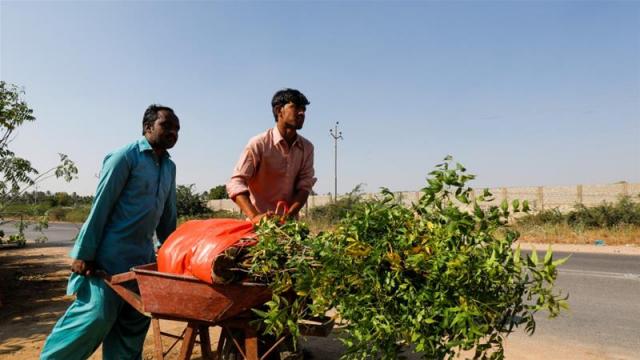
The novel coronavirus has driven thousands of people into unemployment around the world, and while many countries are struggling to tackle the issue, Pakistan has started recruiting the unemployed as "jungle workers" to build its ambitious “10 Billion Tree plantation” initiative aimed at greening the nation.
The mega-tree planting scheme is part of Pakistan’s five-year-plan to replicate its earlier success of the Billion Tree Tsunami Projectcarried out in its North West province.
Pakistan says the initiative to plant 10 billion trees will not only translate into an immediate source of income for about 150,000 people left jobless during the pandemic, but will foster environmental awareness in an impoverished, drought-plagued country where vast swaths of forest have been stripped.
According to the World Bank, forest now covers only 2 percent of all Pakistan, a fraction of the country's former forest density.
The Pakistan Institute of Development Economics estimated COVID-19 could result in more than 10 million people in the country losing their jobs.
In response, workers with the "10 Billion Tree plantation" stand to earn a meager $3 a day planting saplings – enough nonetheless to feed their families and keep parts of the economy running. Government officials say thousands of the new “jungle jobs” have been created, and that by planting vast rows of tiny trees, workers will be helping the country combat the challenges of climate change.
Lockdown restrictions in Pakistan have been eased to allow workers to continue the job while wearing masks and maintaining social distancing to avoid catching the virus.
Pakistan has suffered some of Asia’s worst deforestation and remains among the countries most vulnerable to climate change. Its mountain glaciers are already melting, causing rivers to flood. The World Bank reports that climate change crises have already cost Pakistan $3.8 billion since 1998.
More than 5,000 glaciers remain in northern Pakistan, but many of them are melting at a much faster rate than anticipated because of soaring temperatures in the country's mountainous valleys, reported Pakistan's ministry of climate change.
Between 2004 and 2018, Pakistan successfully completed its first “billion tree Tsunami project,” boosting confidence that it can now execute a “10 Billion Tree Tsunami” at a budget of around $1 billion. The project is about not just planting trees but also conserving and surveying wildlife and creating at least seven national parks.
The government hopes to receive a grant of between $3 and $6 billion from the World Bank and Asian Development Bank, part of which will be used to launch other clean, green projects in Pakistan's cities.
“We have involved local communities to make people understand how trees are important for our future and how Pakistan is vulnerable to climate change,” Pakistan Prime Minister Imran Khan said. Besides those made recently unemployed by the virus, women in mountainous areas have also been hired by the project to grow saplings in nurseries.
Pakistani officials said practical efforts on the tree project won't be greatly affected by the pandemic, since tree planting takes place in the plains, mountains and open-air, where there is little chance of the virus spreading.
Noorin Mustafa, an official associated with the 10 billion tree plantation project, told regional media that before this initiative the billion tree Tsunami generated more than half a million jobs, and "therefore the government hopes that the project of 10 billion trees has more potential to include several thousand labourers to reduce the ratio of unemployment caused by the new virus."
According to Mustafa, the current phase of the project, which involves planting about three billion trees, requires a large amount of fieldwork, which is why the government has issued instructions to the provinces to speed up the work.
An official of Pakistan’s forest department who is directly involved in the tree plantation said that following the federal government's directives for regions to hire more workers, some 19,000 people in one province alone, Khyber Pakhtunkhwa, have already been recruited to plant. "The government has set a target of planting 240 million trees this season and it is expected that 60 percent of this has already been achieved," he said.
Javiria Ahir, parliamentary secretary at the Ministry of Overseas Pakistanis, announced that steps would be taken to also recruit Pakistanis returning home after they've been laid off by companies abroad, especially in Gulf countries.
According to one government estimate, the project will initially employ 150,000 people affected by the pandemic, providing them an income of up to $100 dollars per month.
However, some environmentalists have criticized the move to hire regular labourers as tree planters, saying that planting and caring for plants "is not the job of ordinary day labourers, but the work of people who understand plants,” according to an environmentalist statement.
















